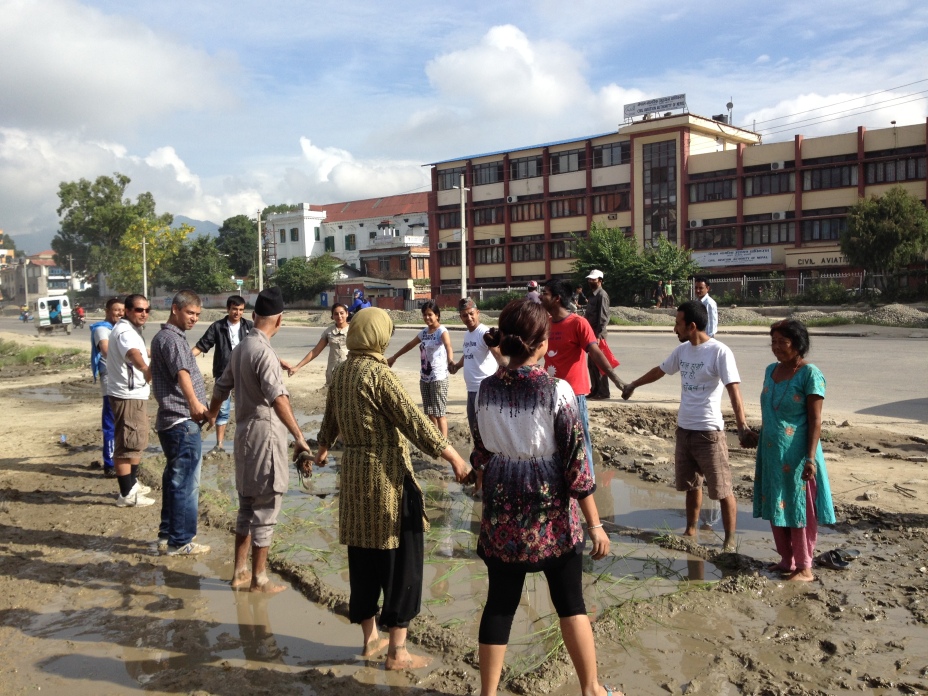Knowledge Management for Development
a global community
Why We Joined the Global Partnership for Social Accountability
Getting our hands dirty for accountability– building communities for change in Nepal.
By: Anne Sophie Lambert, Associate Director
At the World Bank-IMF Annual Meetings, World Vision International’s Local Advocacy Director, Jeff Hall, said that the focus of accountability is “shifting from service-delivery to empowerment.” Along those lines, we believe that building sustainable accountability systems requires cooperation at all levels of society, from the bottom-up as well as top-down.
That is why we we’re excited to join the World Bank’s Global Partnership for Social Accountability (GPSA), which aims to build the capacity of citizens and governments to solve governance challenges together. Within its first year, it has formed a growing coalition of 66 civil society organizations (CSOs), 34 governments, 6 foundations, 4 universities, and 3 multilateral organizations. The GPSA has given $9M in grants to 12 NGOs around the world for transparency and accountability work, and is planning to launch another call for proposals later this November, featuring thematic areas tailored to each individual country. It is also in the process of developing an online Knowledge Portal where practitioners and policymakers can exchange ideas on what works in social accountability and the impact of specific interventions. This will be complemented by offline South-South knowledge exchange through conferences, presentations, and reports. These are all important steps for an institution that has historically been very government focused.
Emilie Fokkelman, a member of the Bank’s GPSA team, explained: “In the Knowledge Platform, the goal is to feed off the strength of existing organizations working on social accountability, to build the capacity of those who are just entering this arena.” As the Accountability Lab’s name indicates, we are deeply invested in supporting creative citizen-led ideas for accountability in developing countries. As one of GPSA’s newest Global Partners, we hope to expand the impact of our work by sharing our successes, failures, and ideas with this network of organizations that share our commitment for this important cause. In turn, we look forward to learning from their rich diversity of perspectives, and their experiences in different contexts all over the world.
To us, “social accountability” means supporting citizens to hold decision-makers to account, using the range of civil society, media and other tools that can help this process. It means creating systems of citizen participation and feedback that prompt power-holders to listen and respond. We believe that a lack of social accountability is the root cause of almost every development challenge, including poverty, exclusion, and violence.
At the recent “Update on the GPSA” meeting, we heard some valuable insights from our fellow Global Partners on why this movement for social accountability needs to involve significant bottom-up initiatives stemming from citizens themselves. Rosa Canete, Director of Oxfam Republica Dominicana, said, “We must invest our efforts in citizens; governments change but citizens do not change, so the sustainability of reforms is through citizens.”
This is certainly true in Nepal and Liberia- For too long development has been a supply-driven process, without programs tailored to context or reflective of local dynamics. Our Accountapreneurs make far more of an impact with their creative, people-centric and cost-effective ideas than many larger, foreign initiatives.
Nalibeli, for example, is a crowd-sourced portal for public information our partners Galli Galli have worked on in Nepal- allowing citizens to access critical knowledge on issues that matter to them- like how to get a birth certificate or receive a pension. The portal has received over 115,000 hits in just a few months, and its use continues to grow. In Liberia, we’ve supported the creation of the first ever film school, through which over 40 young Liberians have already been trained to make documentaries about accountability problems in their communities and to use the visual arts as a tool for change. Their films have now been watched by thousands of people across the country.
These are real social accountability efforts from citizens that understand how to build tools- and the communities around them- that work. It is great to see an initiative like the GPSA that recognizes the value of bottom-up, collaborative accountability solutions of this sort.
What does “social accountability” mean to you and why do you think it is so important to include citizens in the process of making power-holders accountable?
Donate !
***
note if the donate link above does not work for you, click here on donate! and at the bottom of that page click on the donate logo
***
Groups
-
KM4Dev 20 years celebrat…
13 members
-
KM4Dev Core Group
7 members
-
SA-GE - KM4Dev Francopho…
63 members
-
Agenda Knowledge for Dev…
31 members
-
KM4Dev Jobs Centre
344 members

You need to be a member of Knowledge Management for Development to add comments!
Join Knowledge Management for Development